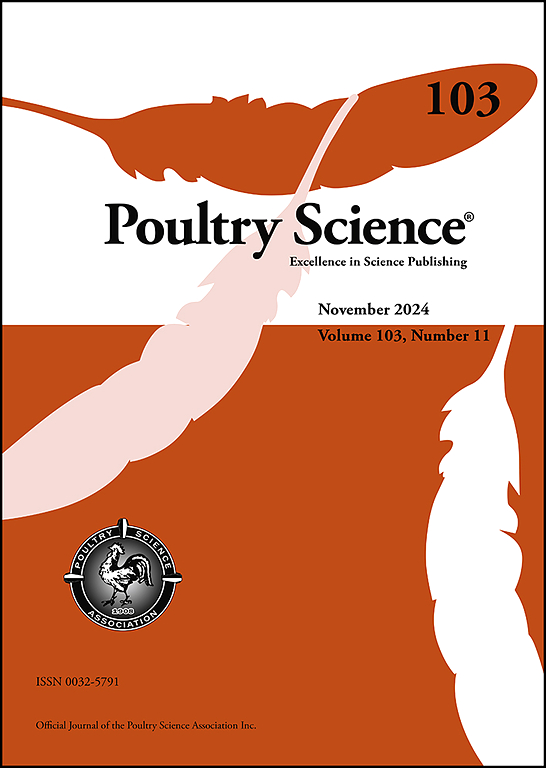地方鸡品种的基线免疫概况:联系生物多样性、动物健康和疫苗接种反应
IF 4.2
1区 农林科学
Q1 AGRICULTURE, DAIRY & ANIMAL SCIENCE
引用次数: 0
摘要
鸡是世界上最重要的农场动物之一。近年来,随着对禽肉和禽蛋需求的增加,鸡在全球营养和农业中发挥着至关重要的作用。然而,由于对高性能品系的关注,牲畜遗传多样性严重丧失,许多传统和地方品种正面临灭绝的威胁。虽然人们认为传统的地方品种对疾病的抵抗力更强,不易受外部影响,但对它们的免疫能力知之甚少。本研究主要研究了德国三个地方鸡品种(Altsteirer、Bielefelder和Ramelsloher)的免疫性能。为了评估一般免疫能力,用流式细胞术分析了naïve鸡整个生命周期的血液样本。在成年鸡中,在T细胞亚型的组成方面检测到较小的品种差异。然而,在日龄雏鸡中,这些T细胞的存在在不同品种之间差别很大。为了评估接种新城疫病毒后的免疫记忆,分析了细胞和体液免疫反应。体内和体外实验均表明,免疫的持续时间取决于遗传背景。在病毒再刺激后,在一个品种中观察到直到耐受性诱导的品种特异性增殖表型。不同地方鸡品种之间的免疫差异可以解释不同地方鸡对新城疫疫苗接种的不同反应,为有机农业的品种选择提供免疫标记。本研究结果代表了鸡品种的遗传多样性,并显示了地方品种免疫能力的差异。因此,这项研究为商业杂交之外的免疫性状遗传变异提供了有价值的见解。本文章由计算机程序翻译,如有差异,请以英文原文为准。
Baseline immune profiles of local chicken breeds: linking biodiversity, animal health, and vaccination response
Chickens are one of the world’s most important farm animals. With an increasing demand for poultry meat and eggs in recent years, chickens play an essential role in global nutrition and agriculture. However, a severe loss of genetic diversity in livestock has been caused by the focus on high-performance lines, with many traditional and local breeds being threatened with extinction. Although it is assumed that traditional local breeds are more resilient to disease and less susceptible to external influences, little is known about their immunocompetence. This study focuses on the immunological performance of three local chicken breeds (Altsteirer, Bielefelder, and Ramelsloher) in Germany. To evaluate general immunocompetence, blood samples from naïve chicken throughout their lifespan were analyzed by flow cytometry. In adult chickens, minor breed differences were detected regarding the composition of T cell subtypes. However, in day-old chicks the presence of these T cells differs greatly between breeds. To assess the immunological memory after Newcastle Disease Virus vaccination, cellular and humoral immune responses were analyzed. Both, in vivo and in vitro experiments revealed that the duration of immunity depends on the genetic background. Breed-specific proliferation phenotypes were observed up to tolerance induction in one breed after viral re-stimulation. The immune differences among local chicken breeds can explain their differential response to Newcastle Disease vaccination, providing immune markers for breed selection in organic farming. The results of the present study represent the genetic diversity of chicken breeds and show differences in the immunocompetence of local breeds. Thus, this study provides valuable insights into the genetic variation of immunological traits beyond commercial hybrids.
求助全文
通过发布文献求助,成功后即可免费获取论文全文。
去求助
来源期刊

Poultry Science
农林科学-奶制品与动物科学
CiteScore
7.60
自引率
15.90%
发文量
0
审稿时长
94 days
期刊介绍:
First self-published in 1921, Poultry Science is an internationally renowned monthly journal, known as the authoritative source for a broad range of poultry information and high-caliber research. The journal plays a pivotal role in the dissemination of preeminent poultry-related knowledge across all disciplines. As of January 2020, Poultry Science will become an Open Access journal with no subscription charges, meaning authors who publish here can make their research immediately, permanently, and freely accessible worldwide while retaining copyright to their work. Papers submitted for publication after October 1, 2019 will be published as Open Access papers.
An international journal, Poultry Science publishes original papers, research notes, symposium papers, and reviews of basic science as applied to poultry. This authoritative source of poultry information is consistently ranked by ISI Impact Factor as one of the top 10 agriculture, dairy and animal science journals to deliver high-caliber research. Currently it is the highest-ranked (by Impact Factor and Eigenfactor) journal dedicated to publishing poultry research. Subject areas include breeding, genetics, education, production, management, environment, health, behavior, welfare, immunology, molecular biology, metabolism, nutrition, physiology, reproduction, processing, and products.
 求助内容:
求助内容: 应助结果提醒方式:
应助结果提醒方式:


